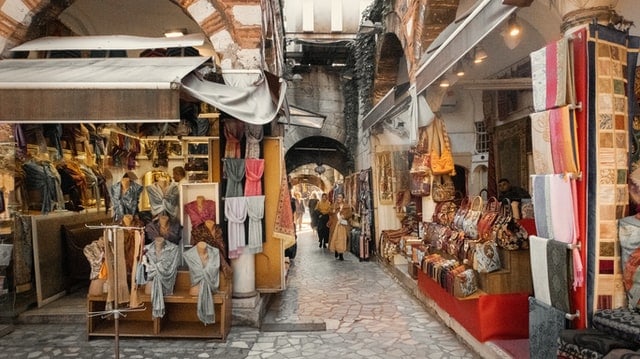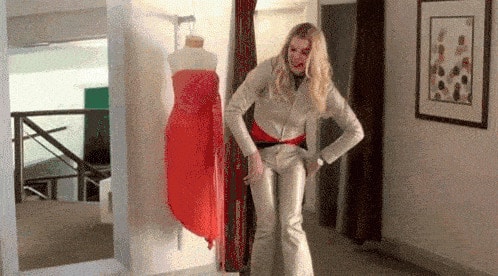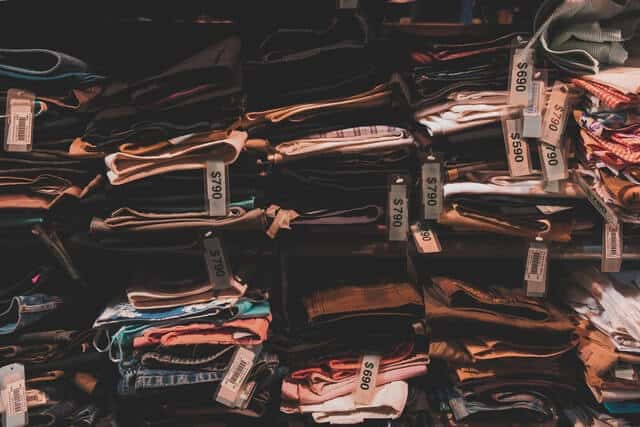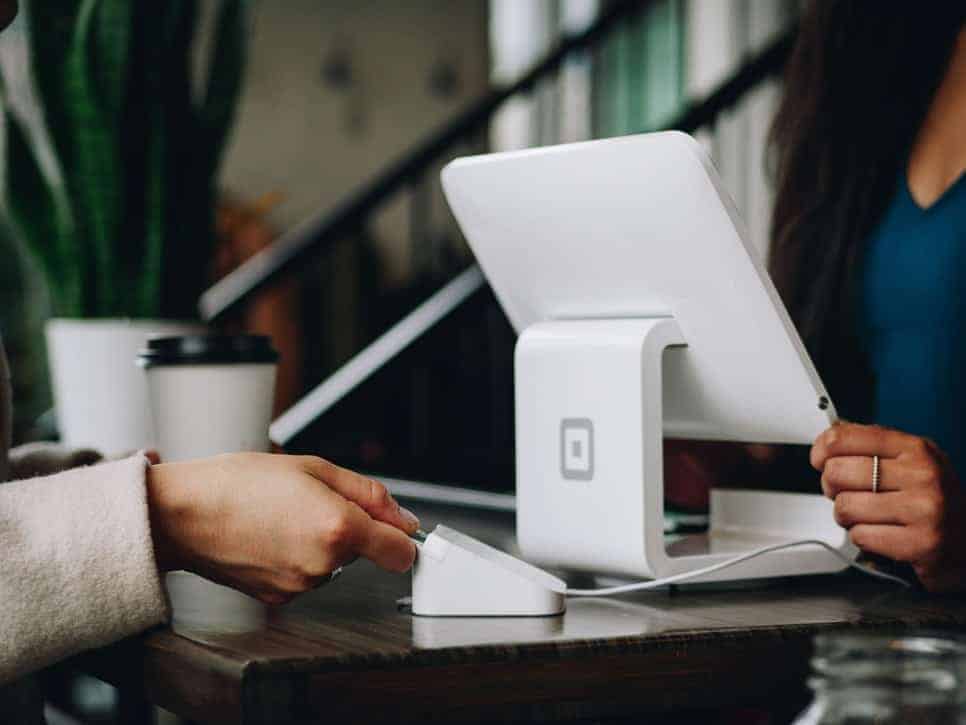How To Say Buy In Spanish
If y'all are learning Spanish or you're just on vacation in one Spanish speaking country, information technology's very likely that at some point you would need to buy something – exist it a snack or a gift. In regards to the production they want to purchase, some new-Spanish speakers have issues explaining what they are looking for. Afterwards all, when shopping, most of the time you need to describe and ask or answer many questions in social club to get exactly what you are looking for, which isn't easy if you are not using your own linguistic communication.
In this article, we are going to discuss how to purchase something and shop in Spanish. Nosotros'll provide you with useful phrases and vocabulary so y'all tin can shop in dissimilar types of businesses. Past the terminate, hopefully you would feel more than confident when you find yourself in this blazon of chat or situation.
Interacting with the Seller: The Questions They May Ask You
One thing you need to keep in mind when buying is that the phrases and expressions you use volition vary depending on where y'all go shopping. Although you have the same purpose, going to a huge supermarket is not the aforementioned as going to a street market where the sellers have more opportunities to interact with the customers. Then let'south run across some of the near common phrases you lot may hear on street markets and small businesses.
¿Buscaba algo en especial? – Are yous looking for something special?
This phrase is very common in minor businesses and street vendors and is the direct translation for 'Are you looking for something special?'. Just as in English language, you may hear this phrase when buying clothes or souvenirs.
| Spanish | English |
| El vendedor: Buenos días, ¿buscaba algo en especial? | The seller: Hullo, are you looking for something special? |
| Tú: No, gracias. Sólo estoy mirando. | You: No, thanks. I'm just looking. |
¿Qué va a llevar? – How can I help you lot?

This Spanish phrase is unremarkably used in street and flea markets besides as corner stores. The direct translation of this phrase is 'What are y'all going to buy?'. Even though this question may exist considered rude in English, in Spanish it's very common when shopping. If you wanted to translate '¿Qué va a llevar?' into English, the closest phrase would be 'How can I help you?'. Simply keep in mind that when maxim '¿Qué va a llevar?' the clerk actually wants to know what product you are looking to purchase.
| Spanish | English |
| El dependiente: Buenos días, ¿qué va a llevar? | The Clerk: Good morning time. How can I help you? |
| Tú: Buenos días, dos litros de leche por favor. | You lot: Good morning, I want two liters of milk. |
Since this question is very directly, yous can answer past proverb the proper name of the product you are looking for. Go on in mind that if you lot hear '¿Qué va a llevar?' in a street market it could hateful two things:
- Just as the corner shop, they are asking you what product you want to buy.
- Information technology can be an invitation to go closer to their stand and then you lot can see their products and they can beginning the sale.
¿Qué le voy/vamos a dar? – How tin I help y'all?
This is some other informal phrase for 'How tin can I help you?'. It'south very similar to '¿Qué va a llevar?' in the sense that the seller wants to know what product yous are looking for. It'due south very common in flea markets or small stores. Simply as '¿Qué va a llevar?', you lot reply this question by proverb the name of the product y'all want..
| Spanish | English |
| El dependiente: Buenos días, ¿qué le voy a dar? | The Clerk: Good morning time. How can I assist yous? |
| Tú: Buenos días, united nations kilo de manzanas, por favor. | You: Good morning, I want 1 kilo of apples, please. |
When selling in Spanish, it's very mutual that the sellers or clerks cohabit the verbs in the plural form when talking to their clients. This doesn't mean that they are talking to a huge number of customers, it's only a casual manner to speak Spanish.
| Spanish | English |
| El dependiente: Buenos días, ¿qué le vamos a dar? | The Clerk: Skillful morning. How can we help you? |
| Tú: Buenos días, united nations kilo de manzanas, por favor. | Yous: Good morning time, I desire ane kilo of apples, delight. |
Describing What You are Looking For
Unless you always go to a store where yous can observe the things you want to buy on your ain, y'all'll demand to be able to communicate with the clerk or the shop banana to ask them for aid. Buying in Spanish could be a lot easier if you knew how to describe the things you want to become. Furthermore, information technology is as well important to exist able to ask questions about the product's quality and characteristics. Below, you lot'll find the most mutual questions and phrases you can use in this type of state of affairs.
Getting What You Want: Asking for Characteristics
An of import part is being able to enquire questions nigh the product'southward features or characteristics. Equally you lot can imagine, the questions you lot may want to ask volition vary depending on the thing you're looking to purchase. However, we are going to show you some mutual questions you could apply and we are going to tell you in which situations you can use them.
Asking virtually Sizes
Although you might call up that this department is but about clothes, you have to remember that there are a lot of products you might be interested in asking about the size and the color. Earlier jumping into examples, it'southward important to mention some vocabulary mistakes y'all desire to avoid.
While in English 'size' is used to limited the dimensions of many objects such as people, clothes, shoes, and objects, in Spanish we have two different words.
- Talla: is the Spanish word for 'size' simply y'all only employ it for dress and shoes.
- Tamaño: also means 'size' simply you use information technology to describe objects and people. Utilize this in situations where you talk over products that aren't apparel.
Hither are some examples:
¿Qué talla es tu camisa? What's your t-shirt size?
¿Cuál es el tamaño de la mochila? What's the size of the backpack?
Since in English, you lot can use the same word in both situations, non-Spanish speakers tend to use 'tamaño' the whole time. Although people might understand y'all, it's improve for your Spanish if y'all learn the difference and use the right word. At present that you lot know the divergence between 'talla' and 'tamaño' you lot can first asking your questions.

When talking about sizes, the near mutual question is:
¿Qué tallas/tamaños tienes? What sizes do you accept?
However, if you lot are looking for a specific size, yous would say:
¿Tiene + talla/tamaño + sizes?
| ¿Tiene tamaño chico? | Do y'all have a size small? |
| ¿Tiene talla 38? | Practise you have a size 38? |
Or:
Quiero + este + product + en talla + sizes
Quiero estos zapatos en talla 35 I want these shoes size 35
Take Annotation: Notice that 'este' is a demonstrative adjective and it needs to change to match the noun'due south gender and number.
Quiero esta bolsa en tamaño chico I want this handbag size small
Vocabulary for describing sizes
| Extra chico | Actress-small |
| Chico | Small |
| Mediano | Medium |
| Grande | Large |
| Extra grande | Extra large |
In Spanish, the sizes must match in gender and number with the subject area. For case:
Mi camisa es talla chica My shirt size is small
Uso calcetines extra grandes I wearable extra large socks
Asking about Colors
Asking well-nigh your production'south color is as of import as asking about the size. In this case, the questions are very similar to the questions related to the size. Let's see some examples.
If you lot simply want to know nearly the different types of colors your product comes in, you would ask:
| ¿Qué colores tiene? | What colors do you lot have? |
Or:
¿Tiene en diferentes colores? Exercise yous take it in different colors?
If you already know what color you are looking for, then you need to change your question a lilliputian scrap:
¿Tiene en + colour + azul/rosa/morado…?
| ¿Tiene en colour azul? | Do you have information technology in blue? |
These previous examples don't mention the product because sometimes it's clear for you and the clerk what'due south the product you are talking about. Just if this is not the case, y'all could just add information technology to the previous construction:
¿Tiene esta camisa en color negro? Do you lot have this t-shirt in black?
Instead of request, you could say directly what you want:
Quiero esta chamarra en color azul I want this jacket in blue
Buying According to your Upkeep
When ownership, there will be sometimes where either y'all have to stick to a upkeep or the store/stand up has different prices for y'all to choose. If this is your case, the following phrases would help to buy within your budget.
Hay desde… – The prices start at…

Sometimes it happens that y'all find a store or stand that has the aforementioned product with dissimilar characteristics and, therefore, different prices. In these cases, after you ask the prices, the clerk or seller will let yous know the price range past telling you:
Hay + desde + amount
Tengo/Tenemos + desde + amount
This simple phrase expresses that the prices start at a certain price and it'southward up to you to cull the best pick.
| Castilian | English |
| Tú: ¿Qué precio tienen las bolsas? | You: How much are the purses? |
| Vendedor: Hay desde 200 pesos. | Clerk: They outset at 200 pesos. |
| Tú: ¿Qué precio tienen los llaveros? | Yous: How much are the key-rings? |
| Vendedor: Tengo desde xx pesos. | Clerk: They start at 20 pesos. |
It could too happen that yous see the prices in a sign, in that instance, you would encounter something similar:
Precios desde + corporeality
| Precios desde 150 pesos | Prices start from 150 pesos |
The Clerk Asks You lot About Your Upkeep
If the store has unlike prices, it's also very likely that instead of giving you the price range, the clerk volition ask you nigh the amount of money you are willing to spend. The following phrases are the Spanish class for 'Exercise y'all have a budget in heed?' or 'What's your budget?':
- ¿Buscaba algún precio en especial?
- ¿De cuánto es su presupuesto?
- ¿Tiene algún precio en mente?
In this case, yous could simply answer past saying the specific amount you want to spend or y'all could give them a range:
| Entre 250 y thou pesos | Between 250 and 1000 pesos |
You could likewise say what's your limit:
Máximo grand pesos g pesos, tops
Que no pase de g pesos No more than 1000 pesos
Buying in a Supermarket or a Store: Asking for Help

In the previous sections, we saw some expressions and questions that will help you to describe the production you lot are looking for. However, there will exist times when you don't collaborate all the fourth dimension with a clerk. Although this happens a lot when buying in a supermarket or a big shop, it doesn't hateful that you lot may not talk at all. Unless you desire to walk around the store until you detect your product, you demand to be able to ask for some instructions.
The post-obit are some questions you could inquire in this blazon of situations:
Request if they sell a product:
¿Tiene/Vende + product?
Disculpe, ¿vende mermelada? Alibi me, do you lot accept jam?
Disculpe, ¿tienen leche deslactosada? Excuse me, do yous have lactose-free milk?
Asking where you tin find your product:
Although some people may think that walking around the aisles can be very relaxing, the truth is that nearly of the time yous just want to buy what you need. Simply if you are in a supermarket or a store that yous don't know, you may have issues finding what you want. If for some reason you are in this situation, here are some Castilian questions you can ask to become help.
¿Dónde están + plural production?
Disculpe, ¿dónde está los lácteos? Alibi me, where are the dairy products?
Or if you want to be more polite:
¿Dónde puedo encontrar + plural production?
Disculpe, ¿dónde puedo encontrar los lácteos? Excuse me, where can I discover the dairy products?
Have Note: When request about a production, we use the plural form because it's more general. If you used the singular form, yous would exist asking for a specific make.
Time to Pay up: Asking for Prices and More
This guide on how to buy and store in Spanish wouldn't be consummate if nosotros didn't talk about paying and asking for the prices. Let's star for the first: asking the price.
When learning Spanish, some new speakers tend to mix '¿Cuánto cuesta?' and '¿Cuánto es?'. Although these 2 expressions can be translated into 'How much is it?' , we don't use them interchangeably. We'll see how to apply both below.
Ask for the cost of one or multiple products:
When you are asking for the prices, y'all would use the following structure.
¿Cuánto cuesta + singular product?
| ¿Cuánto cuesta la leche? | How much is the milk? |
Brand sure the verb matches the number of products you lot are asking for:
¿Cuánto cuestan + plural product?
¿Cuánto cuestan los chocolates? How much are the chocolates?
Inquire for the total cost:
Once yous have gathered all the products yous want to buy and you lot are ready to pay, then you would ask:
| ¿Cuánto es? | How much is it in full? |
| ¿Cuánto va a ser? | How much will it be? |
Do you accept credit cards?
Information technology would be actually bad to go through all the process of asking and describing your product, simply to requite the clerk your credit card and find out that they don't accept this grade of payment. To brand sure you lot're able to pay for your order, you could ask:
¿Qué formas de pago acepta? What forms of payment do you have?
Or:
¿Acepta efectivo/tarjeta de crédito? Practice you lot accept greenbacks/credit carte?

Useful Phrases and Vocabulary to Shopping in Castilian
Although in this article we tried to cover as much as possible on how to buy in Spanish, it wouldn't be complete without some additional vocabulary and useful phrases.
- ¿Puedes mostrarme esa/ese…? → 'Tin can you show me that…?'. Think to alter esa/ese to make them friction match with the noun.
- ¿Tiene cambio? → 'Practise y'all take modify?'. Both y'all and the clerk tin can ask this.
- ¿Tiene united nations billete más chico? → 'Practice you have a smaller bill?'. This question is very common when buying in smaller businesses or stands.
- ¿Quiere una bolsa? → Do you want a pocketbook?
- Sin bolsa → Without pocketbook.
- ¿Me lo puedo probar? → 'Can I endeavor it on?'.
- Me queda muy grande/chico → 'It'due south too big/small on me'.
- ¿Puedes mostrarme otra talla?/tamaño? → 'Can you show me some other size?'.
- Me queda muy grande → It's too loose.
- Me queda apretado → It's also tight.
- No me queda bien → It doesn't fit me well.
- ¿A qué hora cierra? → What time do you close?
- Solo estoy viendo, gracias → 'I'thousand only looking, thanks'. This is a perfect reply when the clerk/shop assistant asks you '¿Qué va a llevar' or '¿Buscaba algo en especial?'.
Wrapping Up
In this commodity, we discussed some dissimilar questions and expressions you can employ depending on the identify you are shopping in. Yous besides learned some common phrases to describe what you lot want or to ask for assist. At present that you know how to buy in Castilian it's time for you to start applying these expressions.
Source: https://www.tellmeinspanish.com/grammar/how-to-buy-in-spanish/

0 Response to "How To Say Buy In Spanish"
Post a Comment